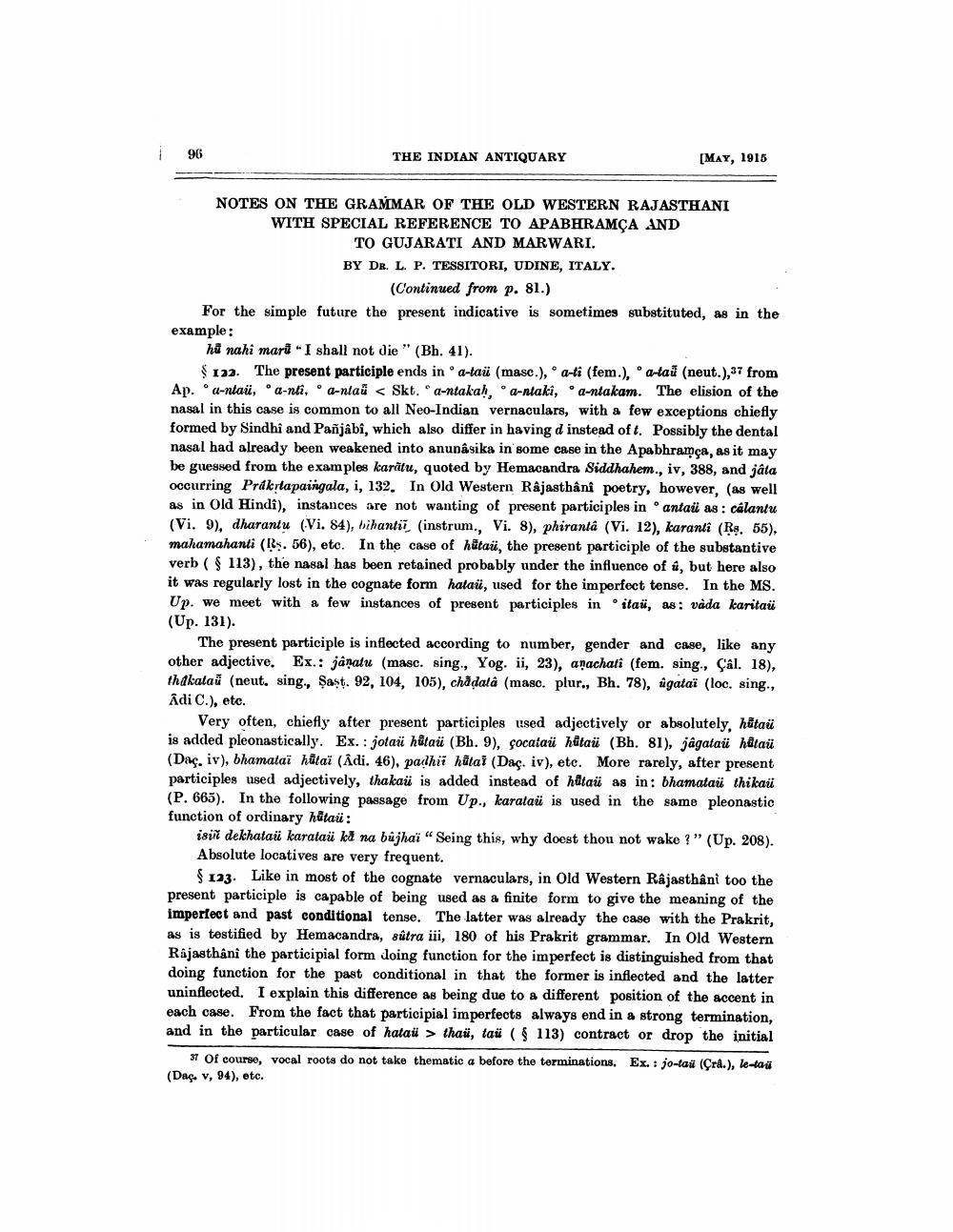________________
196
THE INDIAN ANTIQUARY
[MAY, 1915
NOTES ON THE GRAMMAR OF THE OLD WESTERN RAJASTHANI WITH SPECIAL REFERENCE TO APABHRAMCA AND
TO GUJARATI AND MARWARI. BY DR. L. P. TESSITORI, UDINE, ITALY.
(Continued from p. 81.) For the simple future the present indicative is sometimes substituted, as in the example:
hü nahi mari I shall not die " (Bh. 41).
$132. The present participle ends in a-taü (masc.), a-ti (fem.), a-taŭ (neut.),37 from Ap. a-ntai, a-nti, a-ntau < Skt. a-ntakah, a-ntaki, a-ntakam. The elision of the nasal in this case is common to all Neo-Indian vernaculars, with a few exceptions chiefly formed by Sindhi and Pañjabi, which also differ in having d instead of t. Possibly the dental nasal had already been weakened into anunâsika in some case in the Apabhramca, as it may be guessed from the examples karātu, quoted by Hemacandra Siddhahem., iv, 388, and játa occurring Prákrtapaingala, i, 132. In Old Western Rajasthani poetry, however, as well as in Old Hindi), instances are not wanting of present participles in antai as: calantu (Vi. 9), dharantu (Vi. 84), bihantii (instrum., Vi. 8), phiranta (Vi. 12), karanti (Rs. 55), mahamahanti (Rs. 56), etc. In the case of hataü, the present participle of the substantive verb ( $ 113), the nasal has been retained probably under the influence of , but here also it was regularly lost in the cognate form hataü, used for the imperfect tense. In the MS. Up. we meet with a few instances of present participles in itau, as: vada karitau (Up. 131).
The present participle is inflected according to number, gender and case, like any other adjective. Ex.: janatu (masc. sing., Yog. ii, 23), anachati (fem. sing., Çal. 18), thákataú (neut. sing., Şast. 92, 104, 105), chădatà (masc. plur., Bh. 78), Àgataï (loc, sing., Adi C.), etc.
Very often, chiefly after present participles used adjectively or absolutely, hitaü is added pleonastically. Ex.: jotai hitai (Bh. 9), çocatai hutai (Bh. 81), jagataü hâtai (Das, iv), bhamatai hitaï (Adi. 46), padhii hâtai (Dac. iv), etc. More rarely, after present participles used adjectively, thakaü is added instead of hitai as in: bhamatau thikai (P. 665). In the following passage from Up., karatai is used in the same pleonastic function of ordinary hütaü:
isi dekhatau karataü ka na bujhaï " Seing this, why doost thou not wake?” (Up. 208). Absolute locatives are very frequent.
123. Like in most of the cognate vernaculars, in Old Western Râjasthani too the present participle is capable of being used as a finite form to give the meaning of the imperfect and past conditional tense. The latter was already the case with the Prakrit, as is testified by Hemacandra, sútra iii, 180 of his Prakrit grammar. In Old Western Rajasthani the participial form doing function for the imperfect is distinguished from that doing function for the past conditional in that the former is inflected and the latter uninflected. I explain this difference as being due to a different position of the accent in each case. From the fact that participial imperfects always end in a strong termination, and in the particular case of hatau > thaü, taü ( $ 113) contract or drop the initial
37 Of course, vocal roots do not take thematic a before the terminations. Ex.: jo-tai (Çra.), le-au (Dac. v, 94), etc.




